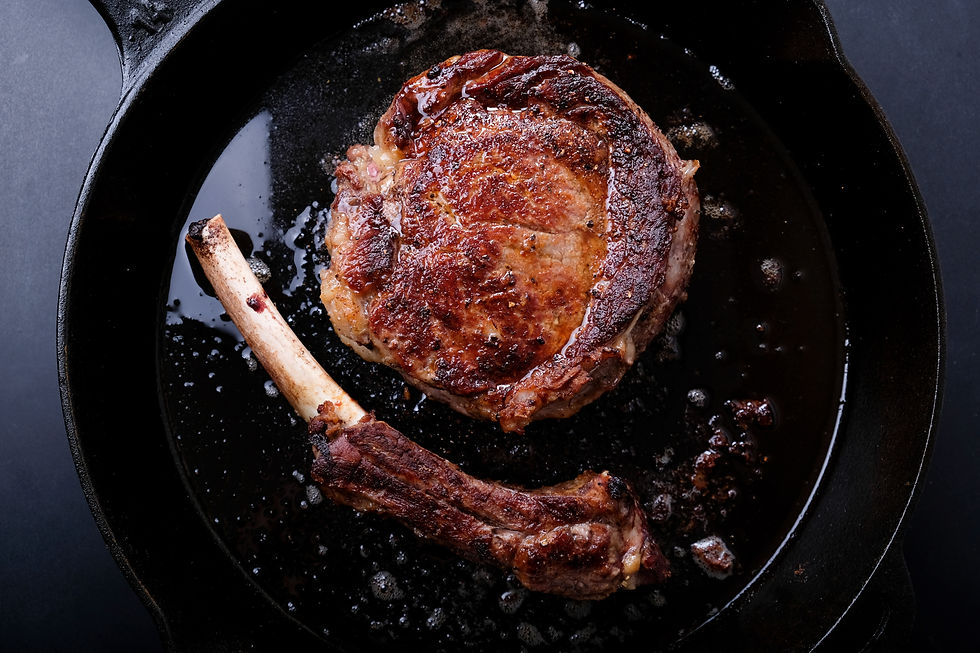Nutrients for Mental Health (And Where to Find Them)
- suprsimpl

- Sep 16, 2019
- 4 min read
Several vitamins, minerals, and fatty acids are correlated with depression, anxiety, memory, focus, and other aspects of mental wellbeing. If you wish to improve or maintain your healthy brain, consider consuming more of the following functional foods.
1. Vitamin D

How it works:
- Vitamin D receptors are active in areas of the brain which regulate emotions.
- When vitamin D breaks down in the body, its processes protect neurons while reducing inflammation.
- Studies have shown a direct correlation between an individual's vitamin D levels and severity of depression symptoms.
Best food sources:
- Salmon
- Sardines
- Tuna
- Cow's Milk
- Eggs
2. B-Complex Vitamins

How they work:
- B vitamins play a role in the transportation of neurotransmitters between the brain and body systems.
- Low levels of several B vitamins have been associated with higher incidence of depression.
- Vitamin B1 has been linked to Alzheimer's and Parkinson's diseases.
Best food sources:
- Almonds
- Sunflower Seeds
- Sardines
- Soybeans
- Tuna
- Lentils
3. Magnesium

How it works:
- Recent studies have shown that when individuals were supplemented with magnesium, their depression symptoms began to reverse.
*Interesting Note* excess consumption of alcohol, sugar, coffee, salt, depletes the body's magnesium stores, as well as chronic stress.
Best food sources:
- Pumpkin Seeds
- Spinach
- Swiss Chard
- Soybeans
- Sesame Seeds
4. Iron

How it works:
- Individuals with iron deficiency are at a greater risk for psychiatric disorders, and may experience worsened symptoms as a result of deficiency.
*Interesting Note* Iron deficiency is a particular concern for women, who lose a significant amount of iron during menstruation. It is estimated that 20 percent of women are iron-deficient.
Best food sources:
- Soybeans
- Lentils
- Spinach
- Sesame Seeds
- Garbanzo Beans
5. Zinc

How it works:
- Zinc deficiency has been associated with depression, and studies have shown that zinc supplementation may be an effective treatment.
*Interesting Note* Dietary deficiency may not be the only cause for inadequate zinc levels — a variety of medications including anticonvulsants, hormones, antacids, anti-inflammatories, and diabetes medications can impact zinc absorption. Chronic inflammation is also known to deplete the body’s zinc reserves.
Best food sources:
- Beef
- Lamb
- Sesame Seeds
- Pumpkin Seeds
- Lentils
6. Selenium

How it works:
- Selenium plays a role in mental health by producing thyroid hormones and reducing inflammation.
- Studies have shown that selenium deficiency is correlated with depression, and supplementation has reduced or prevented the development of depression.
Best food sources:
- Brazil Nuts
- Tuna
- Shrimp
- Sardines
- Salmon
7. Omega-3 Fatty Acids

How they work:
- They reduce inflammation, improve and maintain proper cognitive function, especially memory and mood.
- The brain is mostly made up of fats, and studies have shown that the quality of the fats that our brain cells are made up of directly affects cognitive function. Therefore, it's extremely important for mental health, to choose high-quality fats from sources like these listed below.
Best food sources:
- Flax Seeds
- Walnuts
- Sardines
- Salmon
- Beef
8. Amino Acids

How it works:
- Amino Acids are the building blocks of neurotransmitters.
- Tryptophan, tyrosine, and phenylalanine, found in pumpkin seeds, and high-quality soy, meat, and cheese are essential for the production of serotonin, dopamine, and norepinephrine.
Best food sources:
- Lean Pork Chops
- Chicken Leg
- Soybeans
- Brazil Nuts
- Lean Beef & Lamb
- Pumpkin & Squash Seeds
- Parmesan Cheese
Sources:
Borchard, Therese. "10 Nutritional Deficiencies That May Cause Depression." EverydayHealth.com. Everyday Health, 14 Nov. 2014. Web. 21 May 2019.
Marshall, Helen. “Other Antidepressants: How Do Antidepressants Work? .” Netdoctor, Netdoctor, 15 May 2018, www.netdoctor.co.uk/medicines/antidepressants/a632/other- antidepressants/.
Meyer, Bonnie L, and Elizabeth Johnston Taylor . “A Holistic Approach to Severe Depression: My Story.” NursingCenter, Lippincott, www.nursingcenter.com/journalarticle? Article_ID=775861&Journal_ID=54004&Issue_ID=775851.
Milaneschi, Y, et al. “The Association between Low Vitamin D and Depressive Disorders.” Nature News, Nature Publishing Group, 9 Apr. 2013, www.nature.com/articles/mp201336.
Murray, Michael T., and Joseph E. Pizzorno. The Encyclopedia of Natural Medicine. Simon & Schuster, 2014.
Serefko, Anna, et al. “Magnesium in Depression.” Pharmacological Reports, vol. 65, no. 3, 2013, pp. 547–554., doi:10.1016/s1734-1140(13)71032-6.
Chen, Mu-Hong, et al. “Association between Psychiatric Disorders and Iron Deficiency Anemia among Children and Adolescents: a Nationwide Population-Based Study.” BMC Psychiatry, BioMed Central, 4 June 2013, www.ncbi.nlm.nih.gov/pmc/articles/PMC3680022/.
Coad, Jane, and Cathryn Conlon. “Iron Deficiency in Women.” Current Opinion in Clinical Nutrition and Metabolic Care, vol. 14, no. 6, 2011, pp. 625–634., doi:10.1097/mco. 0b013e32834be6fd.
Swardfager, Walter, et al. “Zinc in Depression: A Meta-Analysis.” Biological Psychiatry, vol. 74, no. 12, 2013, pp. 872–878., doi:10.1016/j.biopsych.2013.05.008.
Ranjbar, Elham, et al. “Effects of Zinc Supplementation in Patients with Major Depression: a Randomized Clinical Trial.” Iranian Journal of Psychiatry, Tehran University of Medical Sciences, June 2013, www.ncbi.nlm.nih.gov/pmc/articles/PMC3796297/.
Vashum, Khanrin Phungamla, et al. “Dietary Zinc Is Associated with a Lower Incidence of Depression: Findings from Two Australian Cohorts.” Journal of Affective Disorders, vol. 166, 2014, pp. 249–257., doi:10.1016/j.jad.2014.05.016.
Petrilli, Matthew A., et al. “The Emerging Role for Zinc in Depression and Psychosis.” Frontiers in Pharmacology, vol. 8, 2017, doi:10.3389/fphar.2017.00414.
Johnson, Leigh A, et al. “The Impact of GPX1 on the Association of Groundwater Selenium and Depression: a Project FRONTIER Study.” BMC Psychiatry, vol. 13, no. 1, 2013, doi: 10.1186/1471-244x-13-7.
Mokhber, Naghmeh, et al. “Effect of Supplementation with Selenium on Postpartum Depression: a Randomized Double-Blind Placebo-Controlled Trial.” The Journal of Maternal- Fetal & Neonatal Medicine, vol. 24, no. 1, 2010, pp. 104–108., doi: 10.3109/14767058.2010.482598.
Conner, Tamlin S, et al. “Optimal Serum Selenium Concentrations Are Associated with Lower Depressive Symptoms and Negative Mood among Young Adults.” The Journal of Nutrition, vol. 145, no. 1, 2014, pp. 59–65., doi:10.3945/jn.114.198010.



Comments